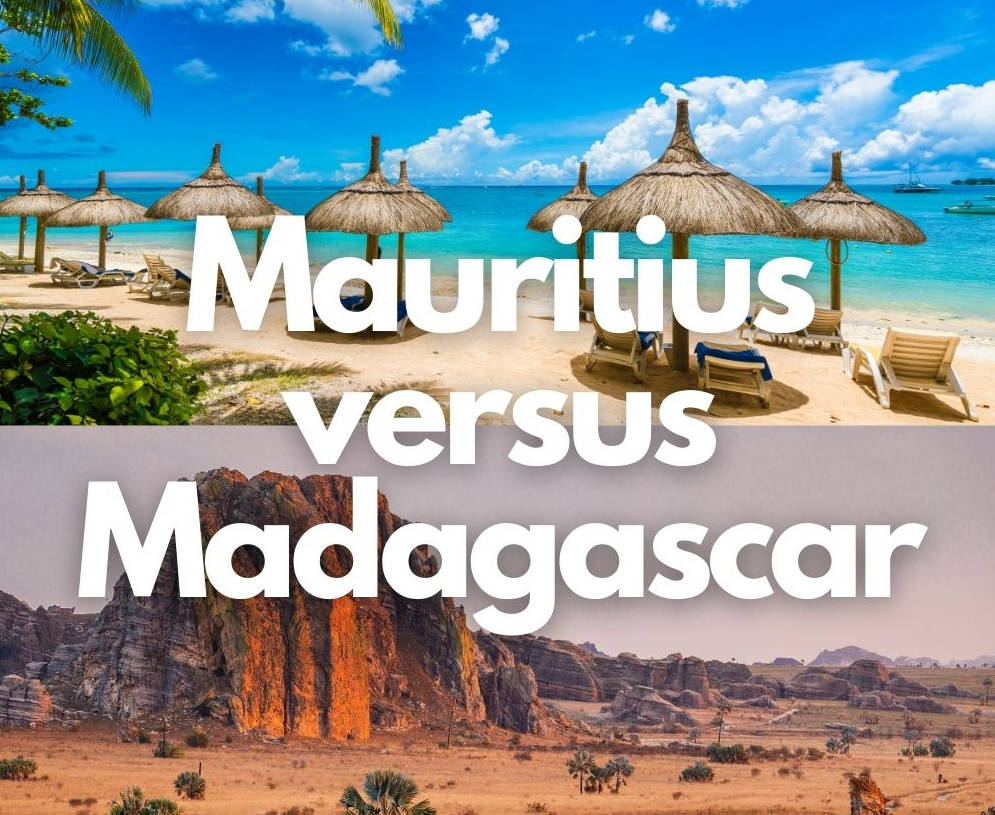Madagascar and Mauritius, situated in the Indian Ocean off Africa’s eastern coast, offer distinct living experiences for expatriates.
Their significant differences in living standards, economy, and infrastructure make an in-depth comparison crucial for those considering a move.
Understanding these contrasts will help expatriates make well-informed decisions about relocating to either of these unique island destinations.
Geographical Overview
Location and Distance
Madagascar, situated as the fourth-largest island globally and positioned within the African continent, spans a significant expanse in the Indian Ocean, approximately 400 kilometers away from the African coastline.
Renowned for its immense biodiversity and vast landscapes, Madagascar’s unique geographical location contributes to its diverse climate zones, featuring tropical rainforests, semi-arid regions, and varying terrains.
On the other hand, Mauritius, a relatively smaller island compared to Madagascar, also lies within the African continent, positioned about 865 kilometers southeast of Madagascar and approximately 1532 kilometers from the African mainland. Known for its picturesque tropical scenery, Mauritius offers a more compact yet enchanting landscape, characterized by stunning beaches, coral reefs, and a blend of diverse cultures influenced by African, Asian, and European heritage.
The geographical proximity between Madagascar and Mauritius, albeit with differences in size and ecological features, presents distinct opportunities and appeals to those seeking contrasting island experiences within the Indian Ocean region.
Size and Biodiversity
Madagascar, covering an expansive territory of 587,041 square kilometers, stands as an emblem of biodiversity, harboring an extraordinary array of endemic plant and animal species within its diverse ecosystems.
This vast landmass provides a canvas for exploration, hosting a mosaic of landscapes from tropical rainforests to semi-arid regions, contributing to its global significance in ecological diversity and conservation efforts.
In contrast, Mauritius, spanning 2040 square kilometers, represents a considerably smaller land area compared to Madagascar. However, this compact size does not diminish its allure; Mauritius is celebrated for its stunning tropical beaches, vibrant coral reefs, and a rich cultural tapestry woven from the influences of African, Asian, and European heritage.
The juxtaposition of Madagascar’s extensive landmass and biodiversity with Mauritius’ smaller yet captivating terrain illustrates the diverse appeal and distinct natural wonders these Indian Ocean islands offer to explorers and enthusiasts alike.
Climate and weather condition
Madagascar and Mauritius, both located in the Indian Ocean, feature diverse climates influenced by their geographical positions. Here’s a comparative analysis of the climates in Madagascar and Mauritius:
Madagascar boasts a diverse climate owing to its expansive size and varying terrains, ranging from tropical rainforests to semi-arid areas. The island experiences distinct seasons, marked by a wet period from November to April and a dry season spanning May to October.
Its climate transitions from tropical in the north, characterized by higher temperatures and rainfall, to subtropical conditions in the central highlands with cooler temperatures. Regionally, the east coast witnesses high rainfall fostering lush rainforests, while the central highlands enjoy cooler temperatures due to elevation, maintaining pleasant weather throughout the year.
Conversely, the west coast encounters reduced rainfall, resulting in a more pronounced dry season and semi-arid conditions. The southern region experiences an extreme climate with arid to semi-arid conditions and minimal rainfall.
Coastal areas maintain warmer temperatures averaging around 25-30°C (77-86°F), whereas the central highlands, due to elevation, exhibit cooler averages ranging from 15-25°C (59-77°F), occasionally dropping lower during the nights. Notably, Madagascar is susceptible to cyclones, primarily impacting the eastern coast during the wet season.
Mauritius experiences a consistently moderate tropical maritime climate influenced by the southeast trade winds. This climate pattern divides the year into two distinct seasons: summer spanning from November to April and winter lasting from May to October.
The regional climate zones include the warmer and more humid coastal areas in contrast to slightly cooler conditions found in the inland regions, particularly the central plateau due to its elevation. Coastal regions see average temperatures ranging from 22-33°C (72-91°F) in summer and 17-26°C (63-79°F) in winter.
Meanwhile, the central plateau maintains cooler temperatures, averaging 17-24°C (63-75°F) in summer and 13-20°C (55-68°F) in winter. Mauritius, like Madagascar, faces the risk of cyclones, especially during the summer months, potentially resulting in heavy rainfall and strong winds affecting the island.
In brief, both Madagascar and Mauritius offer diverse climates, catering to various preferences. Madagascar’s climate ranges from tropical rainforests to arid regions, providing a broad spectrum of environmental experiences.
Mauritius, on the other hand, boasts a more consistent tropical maritime climate with milder variations, making it popular among tourists and expatriates seeking more predictable weather patterns.
Socio-Economic Comparison
Population and Capital
With a population of approximately 27 million people, Madagascar’s bustling capital city is located in Antananarivo. vibrant city serves as a cultural and economic hub, reflecting the diverse fabric of Malagasy society and housing significant administrative and commercial activities within the country.
Conversely, Mauritius, with a population of approximately 1.27 million residents, features Port Louis as its capital city. Notably, Port Louis stands out as the largest urban center in Mauritius, pulsating with economic dynamism, diverse cultural influences, and administrative significance, contributing significantly to the island nation’s socio-economic landscape.
The disparity in population sizes between Madagascar and Mauritius, reflected in their respective capital cities, underlines the contrasting scales of urban life and societal dynamics in these distinct island nations.
Economy and GDP per Capita
Madagascar’s GDP per capita is recorded at $520 USD, with primary economic activities centered around agriculture, agro-industry, tourism, renewable energy, mining, and information technology.
In contrast, Mauritius thrives with a significantly higher GDP per capita of $11,800 USD, reflecting a more diversified economy. Mauritius’ economic landscape concentrates on various sectors such as information technology, textiles, tourism, renewable energy, and seafood products.
The stark contrast in GDP per capita between Madagascar and Mauritius underscores the differences in economic diversification and the varied focus of key industries in each country’s economic development.
Business Environment and Economic Freedom
In the World Bank’s Doing Business 2020 report, Madagascar was positioned at 162nd among 190 economies, portraying notable challenges in its business landscape and hindrances in fostering ease of doing business.
Conversely, Mauritius emerged prominently, securing an impressive 13th rank in the same report. This stark contrast underscores Mauritius’ favorable business environment, characterized by efficient processes facilitating entrepreneurship, simplified property registration procedures, enhanced access to credit, robust investor protection mechanisms, streamlined tax payment systems, and effective contract enforcement measures.
The disparity in rankings between Madagascar and Mauritius highlights the divergent approaches and levels of advancement in creating conducive environments for business operations within these African nations, signifying the varying opportunities and challenges for entrepreneurs and investors considering these destinations.
Infrastructure and Economic Freedom Index
According to the Heritage Foundation’s Economic Freedom Index 2021, Madagascar secured the 131st position globally, indicating a relatively lower degree of economic freedom in comparison to numerous other nations.
In contrast, Mauritius stood out significantly, securing an impressive 8th rank in the same index. This remarkable positioning showcased Mauritius’ higher level of economic freedom, backed by robust factors such as well-defined property rights, substantial trade freedom, a moderate government size, stable monetary policies, considerable investment freedom, and notable labor freedom.
The considerable gap in rankings between Madagascar and Mauritius in the Economic Freedom Index delineates the contrasting levels of economic liberties and institutional frameworks conducive to fostering economic growth and prosperity within these African countries.
Practical Considerations for Expats
Language and Cultural Influence
Madagascar boasts Malagasy and French as its official languages, a reflection of its rich cultural heritage that intertwines indigenous roots with colonial influences.
This linguistic diversity mirrors the fusion of native Malagasy languages with French, representing the country’s historical ties and the impact of French colonialism.
Additionally, English is also increasingly common as one of the languages in Madagascar, as more and more young people are studying this language.
Conversely, Mauritius embraces Creole Mauritian and English as its official languages, encapsulating the vibrant tapestry of its cultural mosaic shaped by diverse ethnicities.
Creole Mauritian, a blend of various languages with French as its base, resonates deeply within the country’s multi-ethnic society, while English serves as a significant language for administration, education, and commerce.
This linguistic combination underscores Mauritius’ unique cultural amalgamation resulting from the convergence of African, Asian, and European influences throughout its history.
Time Zone and Connectivity
Madagascar operates within the GMT+3 time zone, while Mauritius operates within the GMT+4 time zone. Despite their time zone differences, Mauritius stands out for its well-established flight connectivity, boasting a robust network with numerous airlines offering frequent and diverse flight options to and from Europe and neighboring regions. This extensive flight network enhances accessibility and convenience for travelers, contributing to Mauritius’ popularity as a tourist destination and facilitating smooth connections for both tourists and residents traveling to various international destinations.
Living Standards and Infrastructure
Both Madagascar and Mauritius have made significant strides in enhancing their infrastructure; however, Mauritius holds a comparative advantage in terms of overall development, healthcare facilities, and real estate.
While both nations have witnessed improvements in their infrastructure, Mauritius stands out with more developed and modernized facilities across various sectors. The island nation boasts well-established healthcare systems with better-equipped medical facilities, improved accessibility to quality healthcare services, and advancements in medical technology.
Moreover, Mauritius showcases a robust and evolving real estate sector, characterized by modern infrastructure, upscale developments, and diverse property options catering to both local and international investors. This growth in real estate aligns with Mauritius’ economic progress and its status as a sought-after destination for investment and lifestyle choices.
In contrast, while Madagascar has been making strides in infrastructure development, it may face challenges in achieving the same level of advancement and modernization seen in Mauritius due to differences in economic capacities and developmental trajectories between the two countries.
Despite this, Madagascar has been focusing on enhancing various sectors, including telecommunications, energy, and transportation, albeit at a pace that may differ from Mauritius.
Ultimately, Mauritius’ edge in overall infrastructure development, healthcare provisions, and real estate advancements sets it apart from Madagascar, showcasing a more mature and well-established framework supporting its economic and social growth.
Which country is right for you: Mauritius or Madagascar?
Madagascar and Mauritius present distinct advantages and characteristics for expatriates. Madagascar, with its vast natural beauty and diverse ecosystems, appeals to those seeking a unique experience, while Mauritius, with its higher living standards, thriving economy, and cosmopolitan environment, attracts expats looking for a more developed and organized lifestyle.
Ultimately, the choice between these enchanting destinations depends on an individual’s preferences
If you’re a potential expat looking to make the move to Madagascar or invest in the big island, Madagascar Invest can be your partner.
Browse our archive of articles to learn more about living and investing in Madagascar, or take a look at the real estate offerings we currently have available.



 Legal Company Registration
Legal Company Registration
